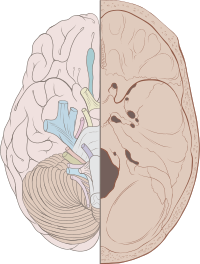
Photo from wikipedia
Background Occipital nerve stimulation is a promising treatment for refractory chronic headache disorders, but is invasive and costly. Identifying predictors of response would be useful in selecting patients. We present… Click to show full abstract
Background Occipital nerve stimulation is a promising treatment for refractory chronic headache disorders, but is invasive and costly. Identifying predictors of response would be useful in selecting patients. We present the results of an open-label prospective cohort study of 100 patients (35 chronic migraine, 33 chronic cluster headache, 20 short-lasting unilateral neuralgiform headache attacks and 12 hemicrania continua) undergoing occipital nerve stimulation, using a multivariate binary regression analysis to identify predictors of response. Results Response rate of the cohort was 48%. Multivariate analysis showed short lasting unilateral neuralgiform headache attacks (OR 6.71; 95% CI 1.49–30.05; p = 0.013) and prior response to greater occipital nerve block (OR 4.22; 95% CI 1.35–13.21; p = 0.013) were associated with increased likelihood of response. Presence of occipital pain (OR 0.27; 95% CI 0.09–0.76; p = 0.014) and the presence of severe anxiety and/or depression (as measured on hospital anxiety and depression score) at time of implantation (OR 0.32; 95% CI 0.11–0.91; p = 0.032) were associated with reduced likelihood of response. Conclusion Possible clinical predictors of response to occipital nerve stimulation for refractory chronic headaches have been identified. Our data shows that those with short-lasting unilateral neuralgiform headache attacks respond better than those with chronic migraine, and that a prior response to greater occipital nerve block is associated with positive outcomes. This study suggests that the presence of occipital pain and severe mood disorder at time of implant are both associated with poor outcomes to occipital nerve stimulation.
Journal Title: Cephalalgia
Year Published: 2018
Link to full text (if available)
Share on Social Media: Sign Up to like & get
recommendations!